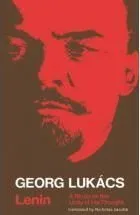Lenin: A Study on the Unity of His Thought
By (author): "Nicholas Jacobs, György Lukács"
Publish Date:
1970
ISBN026212047X
ISBN139780262120470
AsinLenin: A Study on the Unity of His Thought
CharactersVladimir Lenin
Original titleLenin: Studie über den Zusammenhang seiner Gedanken
"The actuality of the revolution: this is the core fo Lenin's thought and his decisive link with Marx." This essay on Lenin, which appeared in 1924, was intended to head off the massive criticism leveled at Lukacs History and Class Consciousness by Communist Party leadership. It was a period in which Lukacs was decisively influenced by Lenin and by Rosa Luxemburg, and his intellectual development proceeded concretely toward a political (Marxist-Leninist) interpretation of history and of literature.In a postscript (1967) Lukacs remains essentially unchanged in his view of Lenin as a practitioner whose theoretical superiority lay in his ability to assess the sociohistorical uniqueness of any given situation that required action. Looking back, Lukacs regards the book as a document of the mid-twenties--of how a number of Marxists of the period saw Lenin's personality and mission and his place in world events. Ideas in the book were determined by the concepts of the period, its prejudices, illusions, and extravagances. Nevertheless, the book established certain spiritual verities in perceiving Lenin as the active-practical sage who had a skillfull tactical grasp of realpolitik which was neither empirical nor dogmatic but the culmination of a theoretical attitude. "His life was one of permanent action, of continuous struggle in a world in which he was profoundly convinced that there was no situation without a solution, for himself or his opponents. The leitmotiv of his life was accordingly: always be armed ready for action--for correct action." Lukacs further notes that an essential dimension of Lenin's activism was unceasingly self-education and constant openness to the lessons of experience. Lukacs also emphasizes a number of points in the book that remain methodologically valid, including criticisms of Lenin's behavior which were implicit and accurate critiques of Stalin's later development and the increasing bureaucratization and mechanization of the party.
